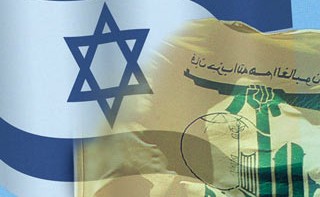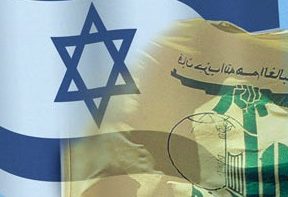Tensions high in northern Israel, after Hezbollah carried out an operation against the Israeli military on Monday at the Lebanon-Israel border, Lebanese sources familiar with the operation said. Hezbollah’s attack was reportedly in retaliation for the death of one of its fighters, killed in an apparent Israeli strike on the edge of Damascus last Monday. UNIFIL commander urged maximum restraint

Israeli forces exchanged fire with Hezbollah fighters along the volatile Israeli-Lebanese frontier on Monday, the heaviest fighting between the bitter enemies in nearly a year.
The Israeli army’s Arabic-language spokesperson Avichay Adraee said troops foiled the Hezbollah attack by three or four men who infiltrated a few metres over the Blue Line, which demarcates Israel’s 2000 withdrawal from Lebanon.
There were no casualties among Israeli forces, Adraee said.
Hezbollah carried out the operation against Israeli soldiers in the disputed Shebaa Farms area, Reuters news agency quoted unnamed sources familiar with the situation as saying.
The raid was in retaliation after an Israel air raid near the Syrian capital, Damascus, killed a Hezbollah fighter last week, the sources said.
Residents in the area were ordered to stay in their houses and “any kind of activity in open areas is forbidden”, an Israeli army statement said.
There was no immediate statement by Hezbollah, but its Al-Manar television channel reported calm had returned to the area.
A resident of the town of Khiam, 5km (2 miles) from Lebanon’s southern border, told Al Jazeera she heard about two dozen explosions and witnessed large columns of smoke rising near Mount Hermon.
Andrea Tenenti, the spokesperson for UN peacekeeping forces in southern Lebanon (UNIFIL), said its commander, Major-General Stefano Del Col, “is in contact with both parties to assess the situation and decrease tension”.
“He urges maximum restraint,” Tenenti told Al Jazeera.
‘It’s coming’
Tension has risen along Israel’s northern frontier with Lebanon and Syria, including the occupied Golan Heights, after a Hezbollah fighter was killed in an apparent Israeli air attack on the edge of Damascus last Monday.
Hezbollah’s second-in-command Naim Qasim said in a televised interview on Sunday “if the Israelis decide to launch a war, we will confront it and we will respond”.
“What happened in Syria is an aggression that led to the death of Ali Kamil Mohsen,” he said of last week’s strikes that killed the Hezbollah member.
Wiam Wahab, a former Lebanese minister and a well-connected pro-Hezbollah politician, said Monday’s incident “was not an operation” by Hezbollah, but may have been a reconnaissance mission.
“It’s coming – but there isn’t one today,” he told local news channel Al Jadeed.
Israeli army spokesman Lieutenant-Colonel Jonathan Conricus said the military was “able to successfully thwart an attempt to infiltrate into Israel”.
“We know for certain they were armed and crossed the Blue Line into Israel,” Conricus told reporters.
He said Israeli troops opened fire on the gunmen after they entered Israeli territory and fire was returned. Conricus said no Israeli forces were wounded in the exchange, but could not comment on the condition of the others who fled the scene.
Lebanese sources quoted by Reuters said there were no Hezbollah casualties.
One source said the fighters fired a guided missile at an Israeli tank, but Conricus said he was unaware of any such incident.
‘Prepared for every scenario’
Speaking in parliament, Israeli Prime Minister Benjamin Netanyahu said the government was closely following developments in the north.
“The military is prepared for every scenario,” he said. “We operate in all the arenas for Israel’s defence – close to our borders and far from our borders.
“Lebanon and Hezbollah will bear the responsibility for any attack from Lebanese territory.”
Netanyahu and Defence Minister Benny Gantz cut short meetings in parliament to meet military commanders at army headquarters in Tel Aviv.
The Shebaa Farms area was captured from Syria’s Golan Heights by Israel in the 1967 Middle East war. Hezbollah and Syria claim it is a Lebanese territory but Syria refuses to demarcate the border with Lebanon and declare in writing that Shebaa is Lebanese .
‘Strategic threat’
Following the killing of two Hezbollah members in Syria last August, Hassan Nasrallah, the group’s leader, pledged that it would respond if Israel killed any more of its fighters in the country.
Hezbollah deployed fighters in Syria as part of Iranian-backed efforts to support President Bashar al-Assad in the country’s nine-year conflict.
Israel sees the presence of Hezbollah and its ally Iran in Syria as a strategic threat, and has mounted hundreds of air raids on Iranian-linked targets there.
The last exchange of fire between Hezbollah and Israel took place in September 2019, when the Lebanese armed group launched rockets across the southern border at an Israeli vehicle, and Israel responded by shelling border areas. There were no confirmed casualties.
That attack came in response to an Israeli drone attack on Beirut’s southern suburbs, a Hezbollah stronghold.
Israel and Hezbollah fought to a stalemate in a month-long war in Lebanon in 2006. 1200 Lebanese mainly civilians were killed in the war while 160 Israelis were killed mainly military . Over a million Lebanese from South Lebanon were displaced
Al Jazeera


Leave a Reply
You must be logged in to post a comment.